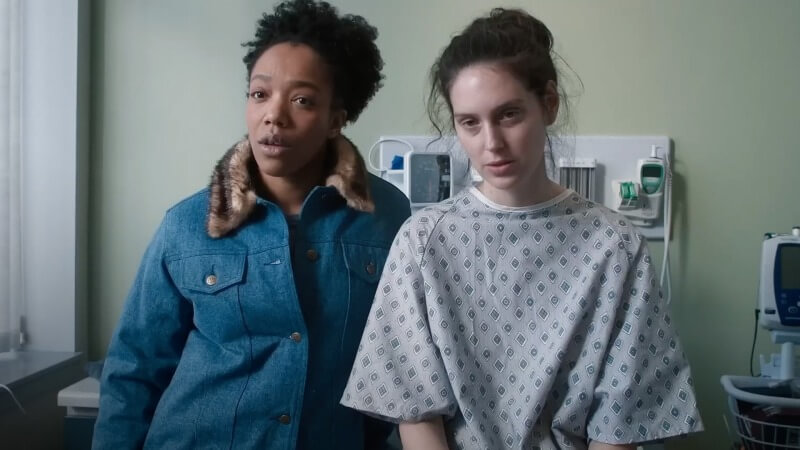No Apology Necessary; Sorry, Baby Is A Marvel

As close as anything comes to a “twist” in Sorry, Baby, the feature debut of comedian, actress, and writer Eva Victor, pops up in its final act: the breathtaking reveal that the “baby” in the title is, in fact, an actual baby. There’s a certain bluesiness to the rubric here, suggesting perhaps a paramour rather than an infant; “sorry, baby, but I’m doing just fine without you,” or, “sorry, baby, I’m leaving this town,” perhaps, seem the likelier statements than the one Victor actually makes: “Sorry, baby, but sometimes, bad stuff just happens.”
Babies respond well to parentese: to cooing and chirping, to oohing and aahing, to hugs, cuddles, and kisses. But the real world exists beyond the domestic bubbles we make for them, whether we like it or not, so odds favor a high percentage of parents today being more open to giving their littles the occasional blunt address about the state of the world they live in. Sorry, Baby isn’t actually about parenting, or even about parents; it’s about the bad stuff in the world, specifically the “bad thing,” as recorded in the film’s lexicon, and how exposed people are as they emerge into adulthood from the comparative safety of their educational backgrounds. Campus, of course, is equally as perilous as the doctor’s office. We–the royal “we”; Victor focuses specifically on young women’s vulnerabilities–take for granted that even safe spaces are safe only by degrees.
Sorry, Baby strides with both feet into that misperception. The film sets aside traces of judgment, and wholly rejects sensationalization; Victor’s script invests their plot with a novelesque structure, broken into chapters, like “The Year With The Questions,” “The Year With The Bad Thing,” and “The Year With The Good Sandwich.” (Each of us deserves the last of these, in light of the authoritarian rodeo clown shitshow 2025 has unfolded as to date.) At face value, that choice appears unremarkable, because a series of vignettes do not a sensitive work of art make. Victor, however, meticulously carves out an economy of storytelling with each segment, to the effect of closing the circuit for their protagonist, Agnes, whom they play on screen. Sorry, Baby allows for Agnes to endure the Bad Thing’s effects, and also spares her the indignity of existing only in context with it.
She’s a complete person, in other words, which so many movies and TV shows about Trauma, Actually™ neglect to consider. Life continues after the Bad Thing. Victor lets a couple of side characters spell out what the “thing” is, brusquely, apathetically, though folks with even partial media literacy will deduce what it is before the film arrives at the section that confirms its nature. Agnes, as we meet her in Sorry, Baby’s flash forward opening, is doing fine, as anyone can be who endures what she does later on in the story (and years prior in its chronology). She lives in the same outlying house she shared with her best friend, Lydie (Naomi Ackie), nearby the small New England college they attended together, and where Agnes now works. These are mixed accomplishments; the house is good and the job is better, but they keep her moored near the site where the bad thing happened.
Sorry, Baby informs Agnes’ struggle through inertia. Characters who suffer likewise to Agnes often find they can’t outrun the past–no matter their effort, one way or another, reminders of their pain resurface to trigger and haunt them anew. Not so for Agnes. Her arc isn’t about escaping what happened to her, but about how she’s bound to it through her residence and employment–stuck in place, strictly speaking by choice but subconsciously because trauma is stultifying. Victor peers straight on into the gloom of Agnes’ circumstances, while using sardonic, droll jokes both to cut through and buttress her emotional distress, which would otherwise smother the picture (as well as the character). Sorry, Baby isn’t operating in George Carlin’s territory, here. There’s nothing funny in Agnes’ debilitated mental health. But if life goes on after the bad thing, then it stands to reason that so too does humor, whether that’s manifested in the banter Victor and Ackie so pleasurably engage in together, or quippy small-talk between Agnes and Pete (John Carroll Lynch) in a sandwich shop parking lot painted in seagull effluvia.
That’s the film’s sweet spot: the space between comedy and melancholy, the kind with ineluctable gravitational weight, pulling down the people unfortunate enough to know it and forcing their lives into holding patterns. Sorry, Baby meshes both sensations together so cleanly that they become one and the same, impossible to disentangle–a rare balancing act between respecting survivor stories and humanizing them. Victor reflects lived experiences through their filmmaking, genuine and whole, the bad existing smack dab next to the good, where the former’s impact hits with grim clarity while the latter sparks with livewire personality. As sobering as the film gets, it remains, as a work of art and expression of Victor’s thoughtful voice, a real joy.
Director: Eva Victor
Writer: Eva Victor
Stars: Eva Victor, Naomi Ackie, Louis Cancelmi, Lucas Hedges, John Carroll Lynch
Release Date: June 27, 2025
Bostonian culture journalist Andy Crump covers the movies, beer, music, and being a dad for way too many outlets, perhaps even yours. He has contributed to Paste since 2013. You can find his collected work at his personal blog. He’s composed of roughly 65% craft beer.







































